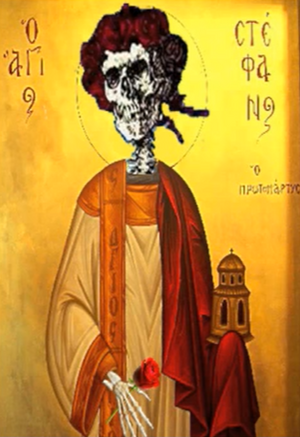Saint Stephen
St. Stephen | |
|---|---|
 San Stefan il Grato, by Sossanetto in the early 14th century | |
| Apprentice, Messenger of Beo, Martyr | |
| Born | Zefand c. AD 100 Agadir, Imazigen Tribal Territory |
| Died | AD 132 Bristra Atranis, Gallaecia, Orthurian Empire |
| Venerated in | Verro Beoin Church |
| Canonized | AD 278, in Avlunio by Magi Gaspar III |
| Major shrine | San Stefano Cathedral Basilica |
| Feast | 9 June |
| Attributes | Rose, rose laurel, skeleton, bucket, golden bell |
| Patronage | casket makers, Carrara, Parthonopia, horses, miners, Kingdom of Parthonopia, |
| Beoin |
|---|
 |
| Beliefs |
| Monotheism • Prayer • Beo • Anidena Magi • Magi • Baatal |
| Texts |
| Diash • Zefeni • Silit'ena |
| Symbols |
| Hesact • Hephsat |
Stephen (c. AD 100 – c. AD 132) is a venerated protomartyr in the continent of Lira from the Verro Beoin faith. He was canonized into the Book of the Apprentices, from the Canon of Beo, in the 3rd Century by Magi Gaspar III. According to the chapter on his life he was an early preacher of Beo's teachings who traveled western Lira in the Orthurian Empire. Throughout his travels it seemed that many would complain about him. Despite this, it was noted in Magi Gaspar III's passage in the Book of Magi that St. Stephen was pivotal to the spread of the Beoin faith to Lira. He was martyred for his teachings in the Gallaecia region of the Produsia province by an Orthurian tribunal. Prior to his execution he gave a speech that would become an important theological record for Verro beliefs, the entirety of which is preserved from a firsthand account in his chapter.
The Verro Beoin Church venerates Stephen as a saint. Traditionally, Stephen is invested with a rose crown of martyrdom; artistic representations often depict him with a rose and a golden bell. Much of Verro Beoin iconography shows him as a faceless, skeletal man with a tonsure, wearing a deacon's vestments, and often holding a bucket or a bell.
Life
According to accounts from historians of the time, including Crisodonos who had met him in person, St. Stephen was born Zefand to a small tribe of nomadic Imazigen near the desert oasis Agadir. Before he was a teen he was taken as a slave by another clan when his was defeated, and slaughtered, in a fight over the right to a watering hole. At some point he was sold to coastal Nisba tribes near Beomedia. Having been raised Beoin, he is said to have had a moment of faith during his time at the holy site. It his claimed this is when he had his epiphany where he was spoken to by God. While he was not able to speak directly with God again, which would have made him a candidate as a Magi, this moment of clarity helped him to endure his slavery.
The Nisba, who were prolific sailors and merchants, would eventually take him from Beomedia and across the Rosel to Lira. Upon nearly arriving to the coast of the distant Orthurian Empire, he would be able to escape his bondage when a surprise storm wreaked the ship transporting him. The sole survivor, the storm seemed to clear and he was able to swim ashore safely. He would later attribute this as an act of God. Once within the Orthurian Empire, having landed somewhere near modern day Carrara, he continued his former nomadic lifestyle.
He survived for years traveling the countryside and sustaining himself from the small amounts of fruits and vegetables he would take from the gardens he would wander in and out of. Eventually he would gain a reputation in the southern Orthurian coast as he traveled and preached the word of Beo. He became recognizable as word spread of a man, adorned in roses, appeared looking as a skeleton and speaking the word of an unknown God.
He would come to even greater local fame when a Nisba trader confronted him during his time in Ancona. The man found Stephen preaching on a street corner while begging for bread and drew a bow and arrow on him. The Nisba was apparently another survivor of the crash that had brought him to Lira and recognized him as a slave. Stephen refused to go with the man and reenter slavery, instead informing the man he would have to kill him. This was when another act of God occurred, accorded to the Canon. The Nisba trader, who was almost in arm's reach of Stephen, let loose an arrow; instead of striking and killing him, the arrow missed and hit the stone wall he leaned against. In what was ascertained to be some sort of divine intervention, the arrow bounced from its impact with the wall and flew to land in the eye of the Nisba, killing him.
The famous Orthurian historian and scholar, Crisodonos witnessed this event take place and was in turn converted to Beoin after following and documenting Stephen for some time. He would continue his wandering lifestyle, going from village to village across the Orthurian Empire and living meagerly as he would spread the teachings of Beo where he went.
Martyrdom
Background
By 132 AD Stephen had found himself along another a coast, the north shores of Produsia in the Gallaecia region. Upon arriving in the port city of Bristra Atranis he would quickly discover a staunch rejection of his preaching. Instead of denying his faith he took a bolder approach and assembled all of the practicing Beoin followers that he could find and held a public mass with a bonfire. He was arrested during it by Orthurian soldiers and brought before a military tribunal for his fate. The tribunal was comprised of the local Magistrate, Vicet, and two Orthurian commanders, Cervius and Gaius Plinius. He was found guilty on a charge to incite unrest and dissent with a two-to-one vote; Plinius, sympathetic to the Beoin teachings, voting against. He was sentenced to death by stoning in the town center and a crowd and group soldiers was drawn for the occurrence. When brought to the place of his execution, before the stoning began Stephen shouted a speech directed at the tribunal that had sentenced him. It was a fluid, almost musical speech that struck the crowd before Vicet demanded the stoning begin.
Speech to Tribunal
- "He had prospered in his time
- Well, he may and he may decline
- Did it matter, does it now?
- Lord!, would answer if he only knew how"
- "Drinking well with a golden bell
- The bucket hang clear to Hell,
- Hell halfway twixt now and then,
- You fill it up and lower down and lower down again!"
- "For the lady finger, dipped in moonlight
- Writing, "What for?", across the morning sky
- That sunlight splatters, dawn will answer.
- Darkness shrugs and bids the day goodbye."
- "Speeding arrow, sharp and narrow
- What a lot of fleeting matters you have spurned!
- Several seasons, with their treasons
- Wrap the babe in scarlet colors."
- "Call it your own!"
- "Did he doubt or did he try?
- Answers are aplenty in the bye and bye.
- Talk about your plenty and talk about your ills,
- But one man gathers what another man spills!"
- "So sayeth Beo will remain!
- All he lost he shall regain!
- Seashore washed by the suds and foam,
- Been here so long, he's got to callin' it home."
- "Fortune comes a crawling! Calliope women,
- Spinning that curious sense of your own!
- Can you answer? Yes, I can.
- What would be the answer to the answer man?"
- "Wake, now!, to find out that you are the eyes of the world!
- The heart has it's beaches, it's homeland and thoughts of it's own,
- Wake, now!, discover that you are the song that the morning brings!
- But the heart has it's seasons, it's evenings and songs of it's own."
Death and aftermath
Following Stephen's speech and death, the crowd was displeased by the event and the riot that had been intended to be quelled was instead ignited. In response to the brutal, violent death of the famously peaceful man and traveling legend, the Beoin population in the area went into an open revolt against the Magistrate. Plinius, who felt terribly guilty over his participation in Stephen's death, aided the rebellion by killing Cervius and handing over Vicet to an angry mob of Beoin converts who stoned him to death.
St. Stephen's Day
St. Stephens Day, celebrated on June 9 annually, is a popularly celebrated holiday and an officially recognized feast day by the Verro Beoin Church. This feast day is particularly popular in Parthonopia and is almost always met with massive, joyous festivals for the occasion. Some major, common traditions for St. Stephen's Day celebrations are centered around community gathering musical events and feasts.